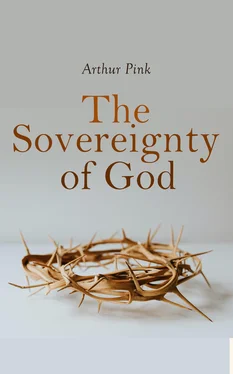We referred to the plagues sent upon Egypt as illustrating God's control of inanimate matter, let us now turn to them again to see how they demonstrate His perfect rulership over irrational creatures. At His Word the river brought forth frogs abundantly, and these frogs entered the palace of Pharaoh and the houses of his servants and, contrary to their natural instincts, they entered the beds, the ovens and the kneadingtroughs (Exo. 8:13). Swarms of flies invaded the land of Egypt, but there were no flies in the land of Goshen! (Exo. 8:22). Next, the cattle were stricken, and we read, "Behold, the hand of the LORD is upon the asses, upon the camels, upon the oxen, and upon the sheep: there shall be a very grievous murrain. And the LORD shall sever between the cattle of Israel and the cattle of Egypt: and there shall nothing die of all that is the children's of Israel. And the LORD appointed a set time, saying, Tomorrow the LORD shall do this thing in the land. And the LORD did that thing on the morrow, and all the cattle of Egypt died: but of the cattle of the children of Israel died not one " (Exo. 9:3-6). In like manner God sent clouds of locusts to plague Pharaoh and his land, appointing the time of their visitation, determining the course and assigning the limits of their depredations.
Angels are not the only ones who do God's bidding. The brute beasts equally perform His pleasure. The sacred ark, the ark of the covenant, is in the country of the Philistines. How is it to be brought back to its home land? Mark the servants of God's choice, and how completely they were beneath His control: "And the Philistines called for the priests and the diviners saying, What shall we do to the ark of the Lord? tell us wherewith we shall send it to his place. And they said... Now therefore make a new cart, and take two mileb kine, on which there hath come no yoke, and tie the kine to the cart, and bring their calves home from them: And take the ark of the Lord, and lay it upon the cart; and put the jewels of gold, which ye return Him for a trespass offering, in a coffer by the side thereof, and send it away that it may go. And see, if it goeth up by the way of his own coast to Bethshemesh, then He hath done us this great evil: but if not, then we shall know that it is not His hand that smote us; it was a chance that happened to us." And what happened? How striking the sequel! "And the kine took the straight way to the way of Bethshemesh, and went along the highway, lowing as they went, and turned not aside to the right hand or to the left" (1 Sam. 6:12). Equally striking is the case of Elijah: "And the word of the LORD came unto him, saying, Get thee hence, and hide thyself by the brook Cherith, that is before Jordan. And it shall be, that thou shalt drink of the brook; and I have commanded the ravens to feed thee there" (1 Kings 17:2-4). The natural instinct of these birds of prey was held in subjection, and instead of consuming the food themselves, they carried it to Jehovah's servant in his solitary retreat.
Is further proof required? then it is ready at hand. God makes a dumb ass to rebuke the prophet's madness. He sends forth two she-bears from the woods to devour forty and two of Elijah's tormentors. In fulfillment of His word, He causes the dogs to lick up the blood of the wicked Jezebel. He seals the mouths of Babylon's lions when Daniel is cast into the den, though, later, He causes them to devour the prophet's accusers. He prepares a great fish to swallow the disobedient Jonah and then, when His ordained hour struck, compelled it to vomit him forth on dry land. At His biding a fish carries a coin to Peter for tribute money, and in order to fulfill His word He makes the cock crow twice after Peter's denial. Thus we see that God reigns over irrational creatures: beasts of the field, birds of the air, fishes of the sea, all perform His Sovereign bidding.
GOD GOVERNS THE CHILDREN OF MEN.
We fully appreciate the fact that this is the most difficult part of our subject, and, accordingly, it will be dealt with at greater length in the pages that follow; but at present we consider the fact of God's government over men in general, before we attempt to deal with the problem in detail.
Two alternatives confront us, and between them we are obliged to choose: either God governs, or He is governed; either God rules, or He is ruled; either God has His way, or men have theirs.
And is our choice between these alternatives hard to make? Shall we say that in man we behold a creature so unruly that he is beyond God's control? Shall we say that sin has alienated the sinner so far from the thrice Holy One that he is outside the pale of His jurisdiction? Or, shall we say that man has been endowed with moral responsibility, and therefore God must leave him entirely free, at least during the period of his probation? Does it necessarily follow because the natural man is an outlaw against Heaven, a rebel against the Divine government, that God is unable to fulfill His purpose through him? We mean, not merely that He may overrule the effects of the actions of evil-doers, nor that He will yet bring the wicked to stand before His judgment-bar so that sentence of punishment may be passed upon them-multitudes of non-Christians believe these things-but, we mean, that every action of the most lawless of His subjects is entirely beneath His control, yea that the actor is, though unknown to himself, carrying out the secret decrees of the Most High. Was it not thus with Judas? and is it possible to select a more extreme case? If then the arch-rebel was performing the counsel of God is it any greater tax upon our faith to believe the same of all rebels?
Our present object is no philosophic inquiry nor metaphysical causistry, but to ascertain the teaching of Scripture upon this profound theme. To the Law and the Testimony, for there only can we learn of the Divine government-its character, its design, its modus operandi, its scope. What then has it pleased God to reveal to us in His blessed Word concerning His rule over the works of His hands, and particularly, over the one who originally was made in His own image and likeness?
"In Him we live, and move, and have our being" (Acts 17:28). What a sweeping assertion is this! These words, be it noted, were addressed, not to one of the churches of God, not to a company of saints who had reached an exalted plane of spirituality, but to a heathen audience, to those who worshipped "the unknown God" and who "mocked" when they heard of the resurrection of the dead. And yet, to the Athenian philosophers, to the Epicureans and Stoics, the Apostle Paul did not hesitate to affirm that they lived and moved and had their being in God, which signified not only that they owed their existence and preservation to the One who made the world and all things therein, but also that their very actions were encompassed and therefore controlled by the Lord of Heaven and earth. Compare Daniel 5:23, last clause!
"The disposings (margin) of the heart, and the answer of the tongue is from the LORD" (Prov. 16:1). Mark that the above declaration is of general application-it is of "man," not simply of believers, that this is predicated. "A man's heart deviseth his way: but the LORD directeth his steps" (Prov. 16:9). If the Lord directs the steps of a man, is it not proof that he is being controlled or governed by God? Again: "There are many devices in a man's heart; nevertheless the counsel of the LORD, that shall stand" (Prov. 19:21). Can this mean anything less than, that no matter what man may desire and plan, it is the will of his Maker which is executed? As an illustration take the "Rich Fool." The "devices" of his heart are made known to us-"And he thought within himself, saying, What shall I do, because I have no room where to bestow my fruits? And he said, This will I do: I will pull down my barns, and build greater; and there I will bestow all my fruits and my goods. And I will say to my soul, Soul, thou hast much goods laid up for many years; take thine ease, eat, drink, and be merry." Such were the "devices" of his heart, nevertheless it was "the counsel of the Lord" that stood. The "I will's" of the rich man came to nought, for "God said unto him, Thou fool, this night shall thy soul be required of thee" (Luke 12:17-20).
Читать дальше












